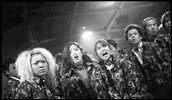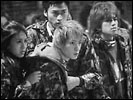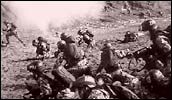Battle Royale II: Requiem
- Year
- 2003
- Original title
- Batoru Rowaiaru II Rekuiemu
- Japanese title
- バトル・ロワイアルII 鎮魂歌
- Alternative title
- Battle Royale II: Revenge
- Director
- Cast
- Running time
- 133 minutes
- Published
- 14 July 2003



by Jasper Sharp
Battle Royale II opens with a spectacular aerial view over Tokyo. Gleaming office buildings dominate the skyline, the image tinged to near sepia by the setting sun. Suddenly an explosion rips through the air, and the phalanx of skyscrapers slowly collapses into rubble. It's a provocative image in today's political climate, but from his treatises on the post-War carve-up of wealth, power and property as typified by the gangster films Wolves, Pigs and Men (1964) and Battles Without Honour and Humanity (1973), Kinji Fukasaku has never been one to mince his words.
Few Japanese films in recent memory have caused such a stir as Battle Royale, Fukasaku's abrasive adaptation of Takami Koushun's popular novel of the same name. Playing like a high-octane hybrid of Lord of the Flies, Friday the 13th and The Most Dangerous Game, its content was enough to stir up a government debate at home. Abroad, more than any other film in recent years it was responsible for bringing in a whole new international audience for Japanese cinema.
Fukasaku had worked closely with his son Kenta on the script of the first film, and at the time of its release made clear that despite the knee-jerk reaction from parliamentarians and press, the theme of Battle Royale, dealing as it does with the repercussions of a system of violence handed down from generation to generation, was one very dear to his heart, having grown up in the chaotic aftermath of his own country's defeat in war.
Sadly it was to prove his last film. At a press conference late last year, the septuagenarian auteur announced that he was terminally ill with cancer. By any definition, Battle Royale would have proven an admirable swansong, but nevertheless, he decided to forego medical treatment in order to start work on the follow-up, based on an original idea by his son. Fukasaku collapsed literally days into the shoot and passed away soon after. Appropriately, the directorial reins were handed over to Kenta, though with the credits quick to stress the involvement of the Fukasaku-Gumi ("Fukasaku Gang"), the crew of collaborators from the first film, it is clear that Fukasaku Jnr was not left to shoulder the burden single-handedly.
As the scale of its opening across Japan would suggest (on the Saturday following what would have been his birthday of July 3rd), what is simultaneously Fukasaku Snr's final work - one that he literally gave up his life for - and Fukasaku Jnr's debut, is probably the most eagerly awaited Japanese film of the year. With such expectations to live up to, it is almost inevitably going to disappoint. This time however, the premise has been taken further away from Koushun's source material (the novelisation of the sequel, adapted by Sugie McCoy, is currently available in Japanese) and closer to the vision of the two Fukasakus. Peppered with such obvious real world allusions to the post-September 11th world order as that contained in the opening sequence, one thing is certain - Kinji Fukasaku's final battle is guaranteed to hit an even rawer nerve with some viewers than the site of school kids wielding axes and machine guns.
Battle Royale II is bigger, bolder and bloodier than the original, but is it any better? Whereas less observant viewers have read the first film as a critique of the harshly competitive Japanese school system, or as documentary proof of the irreversible arc of Japan's post-Bubble descent into psychosis, its absurdist "what if" allegory nevertheless provided an undeniable emotional gut punch. The ultimate high pressure horror scenario, of adolescents taking up arms against their classmates at the command of the seniors, where even your best friends can't be trusted, the film undoubtedly struck a chord with so many viewers simply because it was applicable to any society where the weight of one generation bears heavily down on the next.
But herein lies the problem with Battle Royale II. Whereas the intra-personal dynamics of the first film depended on what the individual viewer brought to the table, there's little such room for ambiguity in the sequel. With its fresh coach-load of teenagers abducted and forced by the state to hunt down and destroy Shuya Nanahara (Fujiwara), the original survivor of the first Battle Royale program, now mastermind behind the Wild Seven organisation which is actively engaged in anti-government terrorist activities, the metaphor is lost in favour of more obvious allusions to the current global state of affairs. Though America is never explicitly mentioned, with this imaginary alternative contemporary Japan being but one of many countries under the umbrella of an anonymous fascist Superstate, at two points in the film a checklist of victims of US military policy is reeled out, from Afghanistan, through Nicaragua and Iraq, to Somalia.
In many ways, the film retreads the path taken by its predecessor, reprising both the Wagnerian strains of its soundtrack and a number of set pieces and motifs, whilst introducing a few new gimmicks, such as a neat twist revolving around the explosive collars. We are in comfortably familiar territory in the opening scenes, in which Middle School Class 3B, a group of problem children from broken homes, are knocked out by an anaesthetic gas on their return from a school rugby trip and taken to a deserted military warehouse where they are debriefed.
Replacing Beat Takeshi in the role of the sadistic overseer of the carnage, we have Riki Takeuchi, an iconic presence for the target market in Japan through his regular excursions in V-cinema productions and numerous works by the director Takashi Miike, though hardly of the same household profile as Kitano. Riki steps up his hard man persona to hyperbolic levels, champing permanently on amphetamines as he barks out orders and gurns into the camera, though his over-the-top performance is unlikely to provoke positive reactions amongst audiences unfamiliar with his shtick.
Kitted out in camouflaged military uniforms, the class of unwilling recruits is dispatched out to the island hideout where Nanahara is holed up with a ragged assortment of desperados eager to hold his government to task for their evils. After a terse battle to reach the Wild Seven base, where they are encircled by the activists and their collars are removed, the survivors are welcomed into Nanahara's ranks in a sequence so misplaced it will bowl you over. Clad in a blanket, and cradling an AK47 in his arms, his young face set in the wide-eyed Frodo-like stare of the young innocent swept up in bloodshed by circumstances far beyond his control, Nanahara recounts his flight from the island into central Asia. Suddenly the image cuts from his misty-eyed face to TV news-styled video footage of young Afghan children waving at the camera, standing surrounded by rubble. At first shocking, it later sunk in that this was perhaps the first images I'd seen of the country since the CNN war reporters departed two years ago for their next destination.
Of course, the very focus of the Battle Royale films is that war inevitably implicates children, as the director knows all too well having worked in a munitions factory as a child during the bombing raids in the war, and that those children that survive will always carry the scars. Nanahara's new hideout is riddled with wailing babies and grimy orphaned kids, and the surviving class members are led into the heart of it by a young girl wearing a red cape. At this point, it's difficult not to think of Nicholas Roeg's Don't Look Now (1973), but perhaps Fukasaku's pop-cultural references lies closer to home, more specifically with the Mamoru Oshii scripted animation Jin-Roh: The Wolf Brigade (dir: Hiroyuki Okiura, 1998), a film that used Little Red Riding Hood imagery in a tale of anti-government activists in an alternative post-War Japan not so dissimilar to this one. But I'm still not quite sure about the effectiveness of the Afghan scenes. Whilst providing one of the film's real shock wake-up call moments, the effect is perhaps just a little too brazen.
Regardless of political dimension, in expanding its vision, Battle Royale II comes across as far less dramatically cogent than its model. Interestingly, the substitution of school uniforms for combat fatigues has an unexpected distancing effect, and we no longer seem to care quite so much about the fates of the individuals. A gruelling Saving Private Ryan inspired landing sequence sees the majority of Class 3 wiped out within the first reel. Shot in shaky handheld cameras, this visceral and undeniably exciting section peaks far too soon as the film's dramatic highpoint, and the running time simply cannot maintain the momentum through into the subsequent pyrotechnics. It also rids us of some of the most potentially interesting characters before we even get a chance to know them - the sassy punkette with a leonine mane of peroxide blonde hair, one of the most visible in the publicity stills, doesn't even make it past home base.
Out of the handful of survivors recruited into Nanahara's quasi-Al Qaida, we are left only with such flatly depicted ciphers as Takuma (in a histrionically one-note performance from pretty boy Oshinari) as our main audience hooks. The newly re-armed Nanahara is too detached and aloof to engage our sympathies, and seems to have little continuity to the character of the earlier film. Shiori, the tearaway daughter of Kitano alluded to last time in the teacher's unhealthy fixation on Noriko (in real life, Noriko's Aki Maeda is the elder sister to Shiori's Ai Maeda) piques our interest in a series of flashbacks detailing her relationship with her estranged father (hence Kitano's prominent position in the credits, though he has little screen time) and her desire to avenge his death, but this avenue is never exploited to its fullest. Elsewhere Riki's dramatic demise in full rugby strip and a bizarre vision of Afghanistan showered in cherry blossom petals at the film's coda teeter from vicious political satire into the realms of the ludicrous.
Only time will tell what sort of impact Battle Royale II is going to have with viewers around the globe. Unsurprisingly, given the current hysterical political climate, where "terrorism" is the new "communism" and there's an enemy lurking in every corner of the globe, there will be no US release, as with the first film. But given the tide of opinion around the rest of the world surrounding the track record of the fanatical Bush administration, there's undoubtedly going to be plenty out there who will lap it up.
At a time when filmmaking has become increasingly sensitive, apolitical and wishy-washy, and nowhere more so than in Japan, Battle Royale II represents something of a watershed, both breathtakingly bold in audience targeting and potentially foolish in the way that it avails itself all too easily to all manner of criticism from outside. One can't help admire the sheer balls of the exercise, but the perhaps the greatest tragedy is that it's not a better film, though I think I'll have to see it again before I make my final judgement.